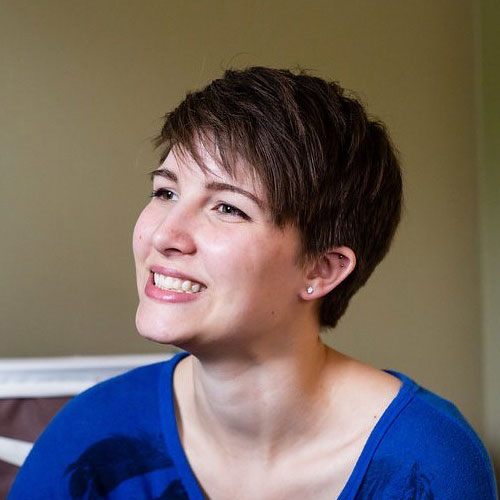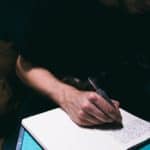Finding the Narrator
– Fierce Fiction by Debbi Hofsink-Borst –

Do you consider yourself a main character? I know I used to. I think that during some period in everyone’s life they picture themselves as the focus of a movie, the centerpiece for some master story. He thinks he’s captivating, she thinks she’s mysterious. We all do it – we can’t stop ourselves from aspiring to importance, can we? And some of us even end up being right.
I, however, have had the unfortunate experience of realizing that I’m no main character. As a focal point, I’m afraid I’d be rather dull. Even my dad used to say that I’m the kind of girl who looks like she’s never had an original thought in her life, and honestly, that’s a fair description. People take one look at me and think, oh, another brunette white girl. I’ve immediately forgotten her.
Don’t get me wrong, I’m not out for your sympathy. That’s not my intention at all. Being an extra on set is the greatest pleasure in my life. People do and say all sorts of things around me – things they wouldn’t want repeated, things they shouldn’t let strangers overhear. And I love to soak it all in. To watch, to listen, to learn. I’ve kept it all for myself, of course, mainly because I don’t know what to do with it. Or with myself, for that matter. But lately I’ve been realizing that I’ve observed some fascinating, bizarre nonsense – nonsense that others might just be interested in hearing.
Take, for instance, this one girl I encountered in Smithers Center Park the other day. It was a gloomy September afternoon, and the park was almost devoid of company, but she was a prime specimen: golden-brown skin, sleek black hair sporting a pink highlight, fascinatingly polished white nails, pretty but with a mouth just too large for her face in order to make her relatable and appealing. She walked delicately on the tips of her toes, stepping nimbly around the puddles, giving off dancer-inside-of-a-music-box vibes. As she came nearer, I could see that she was tapping out an inconsistent beat on the strap of her classy leather shoulder-bag. She hummed a pretty little tune. My music-box simile strengthened. Here she was, this potentially perfect protagonist. I lowered my book and waited.
As I watched her walk down the picturesque park path on that cloudy day, she looked up at the treetops and smiled at the falling leaves. She knew something the rest of us didn’t; that couldn’t be clearer. She shifted her satchel and expanded her smile into a toothy grin. Choosing the park bench across from mine, she sat clumsily. Fumbling with her bag with practiced unease, she lifted it off of her, and a book spilled out. It bumped off the edge of the bench and landed with a splash on the wet walkway.
The girl cried out in a dismay too intense for simply dropping a raggedy book – a passing jogger gave her an odd glance – and she snatched it up out of the puddle, dripping. It was absolutely soaked. I shifted on my suddenly too-hard bench as she began to cry.
My curiosity was drawn to this ruined book that could evoke such an emotional response in a seemingly care-free teenager. It was one of those ancient types with no title on the cover or spine, deep-green and oaky. Worthless, practically falling apart, it probably smelled horrible now that it was wet. There would be no salvaging this relic.
Our protagonist continued to sob from her place on the wooden park bench, hugging the unsightly tome to her chest and effectively ruining her blouse. I couldn’t stop staring at her – she made such a picture, with her head framed by the extended arms of a stern statue in the fountain behind her. Her weeping mingled with the soothing trickle of water.
She stopped crying as suddenly as she had begun. Wiping her tears on her pink sleeve, she stood and lovingly placed the book on the bench. She walked over to the circle of dirt that surrounded the stone fountain. The center statue glared down at her as she kneeled down and began to dig with her delicate hands.
After a rough minute she looked up abruptly and squinted right at me. I froze. I couldn’t pretend to be busy with something else, she knew I was watching. Of course, I was watching. Who wouldn’t be?
“Help me,” she said softly.
A thunderclap sounded in the distance. I knew I had to help this girl – after all, that’s what supporting characters do. I smiled in a way that I hoped was reassuring as I rose and walked over to her. She didn’t say another word, just continued digging as I knelt and joined her.
The earth was soft and moist, reminiscent of the many rainfalls we’d had recently. We dug a hole a foot deep in no time at all. Questions itched on my tongue all the while, but I knew better than to ask them.
When we had finished, the wind had picked up and carried a chill. The girl stood, retrieved her still-soaked book from where it lay, shivered, and brought it back to the hole where I still sat. Simply waiting.
We buried her book with an eerie reverence. I tried to make eye contact with my curious companion, but she never looked up. Just kept piling dirt into the hole and patting it down gently. Pile, pat, repeat.
The rain started to fall when we’d finished. Thunder pealed again, this time overhead. The girl stood up, wiped her filthy hands on her white shorts, looked at me, and nodded. A single tear rolled down her puffy cheek. Then she turned, walked to the bench to retrieve her shoulder-bag, and quickly shuffled off down the cobblestone path.
I watched her go until she rounded the corner behind the fountain and was gone from sight. I looked down again at the lump of disturbed earth at my knees. I stared and stared at it, trying to make sense of what just occurred, trying to see again the book beneath, watching the rain transform the dirt into a muddy mess.
So many questions. What was in the book? Why did it matter? Who was she, that she would bury a book? Would it be wrong to dig it up and read it?
The answer to the last question, I decided, was a firm yes. Yes, it would be wrong. I wasn’t sure why. But in that moment, like a camera panning outward, I felt like that solitary being that knew absolutely everything and entirely nothing. Most importantly, I knew that it wasn’t my story.
The raindrops pelted down on my head. I smiled, pressed my hand into the muddy mound, and knew something else. There was a place for me after all – not supporting, not main. But I knew who I was.

About the Author – Debbi Hofsink-Borst
Debbi Hofsink-Borst is an undergraduate psychology student from Smithers, BC, currently studying at the University of British Columbia, Okanagan. She was inspired in the fifth grade to start writing and hasn’t stopped since, always trying to pen pieces that give her that camera-panning-outward feeling. She lives in Vernon with her husband, Iwan, where she is currently working on an arsenal of short stories and her first novel.
Did you like this story by Debbi Hofsink-Borst? Then you might also like:
Danny’s Song
Eliminating Rahiem
Wanderlust
Pieces of You
Like reading print publications? Consider subscribing to the Dreamers Magazine!

Dreamers Writing Prompt Generator
Experience the power of simplicity with our unique writing prompt generator. Designed for writers who crave spontaneity and surprise, our tool delivers one meticulously crafted prompt at a time.

Top 25 Most Popular Manga Right Now
If you’re searching for the most popular Manga right now, this top 25 list is the ideal starting point, whether a beginner or enthusiast.